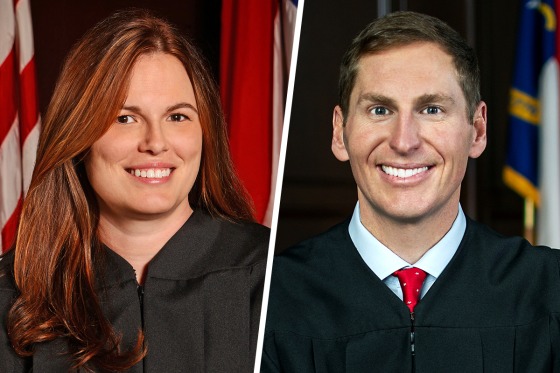
Tuesday’s ruling by the North Carolina Supreme Court prevents state authorities from accrediting the Democratic nominee as the victor of a close contest for the state’s highest court.
All but one Republican on the state Supreme Court voted against the North Carolina State Board of Elections recognizing the outcome of the election, in which Democratic Justice Allison Riggs leads Republican Jefferson Griffin by 734 votes, in a 4-2 decision. Riggs did not participate in Tuesday’s order.
The court’s ruling that Riggs wants to stay on and that Griffin wants to join permits the justices to immediately consider Griffin’s appeal, which aims to nullify 60,000 votes cast in November.
The decision promised to resolve the matter quickly and provided a timeline that requires all case briefs to be submitted by January 24.
A string of recounts resulted from Riggs, who was appointed to the state Supreme Court in 2023, emerging from Election Day with a slim lead over Griffin. Out of over 5.5 million votes, Riggs led Griffin by 734 votes in both a partial manual recount and a full machine recount.
Griffin then filed hundreds of lawsuits in all 100 counties of North Carolina, alleging that about 60,000 people had cast illegitimate ballots. Many of those voters, according to Griffin’s and the North Carolina Republican Party’s attorneys, did not have a Social Security number or driver’s license number on file in their voter registration records. The accusations also concerned foreign voters who did not provide a photo ID with their ballots and had not resided in North Carolina.
But last month, Griffin’s three types of protests were turned down by the state elections board, which is 3-2 Democratic. Griffin then requested that his challenges be heard by the state Supreme Court.
Because the North Carolina Democratic Party had preemptively filed a federal complaint in December to ensure that all ballots in the election were tallied, the case was first heard in federal court.
However, the federal judge presiding over the case—who is an appointment of President-elect Donald Trump—sided with Griffin’s request on Monday and returned it to the state level. Although the U.S. Court of Appeals for the 4th Circuit has received an appeal of that ruling from the North Carolina board of elections, the court has not set a date for first papers until February.
In its ruling on Tuesday, four of the five Republican justices on the state Supreme Court stated that Griffin’s request to have the election’s certification blocked so it could assess the allegations pertaining to the 60,000 votes would be granted because the federal court remanded the case back to the state level.
In accordance with the legal theory known as the “Purcell principle,” the only Republican to dissent, Richard Dietz, said that judicial action near an election “becomes inappropriate because it can damage the integrity of the election process.”
He described Griffin’s attempt as “post-election litigation that seeks to remove the legal right to vote from people who lawfully voted under the laws and regulations that existed during the voting process.”
“The harm this type of post-election legal challenge could inflict on the integrity of our elections is precisely what the Purcell principle is designed to avoid,” Dietz said, before adding that he did “believe some of these legal challenges likely have merit.”
In his dissenting opinion, the court’s lone Democrat who cast a vote stated that the requirements for a temporary stay had not been met in this case, adding that there was no chance of success on the merits and that the public interest demanded that the Court refrain from interfering with the regular course of democratic processes as established by state constitution and statute.
The most recent development drew criticism from Democrats in North Carolina and the Republicans on the Supreme Court.
Roy Cooper, the former governor, wrote on X that Republicans are unhappy with the results and want to throw thousands of legitimate votes in the garbage.
Cooper argued that this should not be about party politics but rather about ensuring that every vote matters and that our elections continue to have significance.
Note: Every piece of content is rigorously reviewed by our team of experienced writers and editors to ensure its accuracy. Our writers use credible sources and adhere to strict fact-checking protocols to verify all claims and data before publication. If an error is identified, we promptly correct it and strive for transparency in all updates, feel free to reach out to us via email. We appreciate your trust and support!
